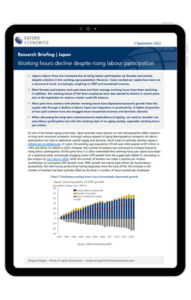Working hours decline despite rising labour participation in Japan
 Japan’s labour force has increased due to rising labour participation by females and seniors, despite a decline in the working-age population. However, hours worked per capita have been on a downward trend, increasingly weighing on GDP and household incomes.
Japan’s labour force has increased due to rising labour participation by females and seniors, despite a decline in the working-age population. However, hours worked per capita have been on a downward trend, increasingly weighing on GDP and household incomes.
What you will learn:
- Most females and seniors work part-time and their average working hours have been declining. In addition, the working hours of full-time employees have also started to decline in recent years due to the legislation to restore a better work-life balance.
- More part-time workers with shorter working hours have depressed economic growth from the supply side through a decline in labour input and stagnation in productivity. A higher proportion of low-paid workers have also dragged down household incomes and domestic demand.
- When discussing the long-term macroeconomic implications of ageing, we need to consider not only labour participation but also the working style of an aging society, especially working hours per worker.
Tags:
Related posts

Post
How Asia’s supply chains are changing | Techonomics Talks
Global supply chains have continued to expand, despite talk of deglobalization and nearshoring. US and Japan have started to de-couple from China, but other G7 countries grow more dependent on Chinese inputs. Several "hotspots" are emerging across Asia with multiple winning formulas.
Find Out More
Post
BoJ to raise its policy rate cautiously to 1% by 2028
We now project that the Bank of Japan will start to raise its policy rate next spring assuming another robust wage settlement at the Spring Negotiation. If inflation remains on a path towards 2%, the BoJ will likely raise rates cautiously to a terminal rate of around 1% in 2028.
Find Out More
Post
Japan inflation to rise to 1.8%, but downside risks are high
Reflecting a surprisingly strong Spring Negotiation result and weaker yen assumption, we have upgraded our baseline wage and inflation forecasts. We now project higher wage settlements will push inflation towards 1.8% by 2027. Uncertainty is high, however.
Find Out More